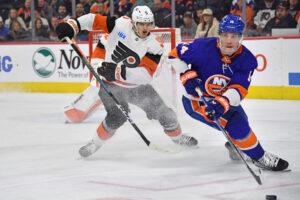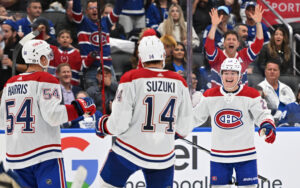This broken NHL season has crashed into a pile of question marks. There were already several unknowns coming into the 2019-20 season, and 69 games later there aren’t many answers. Not all questions are created equal. In this article, we’re going to work through the Vancouver Canucks free agent defence. And yes, the goaltending is going to get their own piece soon. We know you’re waiting.
Vancouver Canucks Free Agent Defence
Our basic assumptions are these: no free-money buyouts; a flat cap; no trades during the draft or in the shortened off-season. Going by the omnipresent Cap Friendly, the Canucks will finish the season with just over $20.5 million in space, less around $2 million in bonus overages. We’re also assuming it’s $2.5 million lower than listed as well – that’s the cap staying flat rather than increasing to $84 million.
Now, at the end of our free-agent forwards piece, the Canucks had $8.625 million left. While the defence has been an Achilles Heel for Vancouver for a few years, what can be done about it? As it happens, not much might be needed.
Something Old, Something New
Vancouver has two unrestricted free agents on the blue line, and one is a frequent topic of conversation among fans. And has been for years, despite his being one of the team’s best for at least half his decade-long tenure.
My Dad Can Beat Up Your Dad
When he entered the league, long-time Canuck Kevin Bieksa described Chris Tanev as being so calm he could play “with a cigarette in his mouth.” That is still the hallmark of the Canucks free agent defenceman ten years later. Tanev’s scoring has never been all that impressive, making a difficult pitch of an extension. His twenty points this season ties his career-best, in fact. One weird difference over previous years is his penalty minutes doubling from a career-high of eighteen last season to 41 this year. This included his first career fight – against Bobby Ryan – in part of the Canucks’ strange February fight streak after an injury to Elias Pettersson.*
So if he’s not a scorer and not a tough guy, what does he do? Mostly? Defend. And he does it very well. Though he and Quinn Hughes is far and away the preferred pairing, spending over 700 minutes together this season, this year has been his worst expected goals against in five seasons. In the previous five years, he was part of the team’s best defensive pair. Clearly, he was used as Hughes’ “defensive conscience” this year. He’s also been there for Hughes off the ice, earning his nickname.
The big question is whether that is worth re-signing the $4.45 million veteran. As difficult as it is, we’re not sure the team can afford a player who has missed approximately 27 games a season to injury between 2014-15 and 2018-19. Unless he is willing to cut his salary in half, Tanev walks away.
Best Supporting Role Goes To…
Oscar Fantenberg was brought in as a replacement for the slightly older Alex Biega. Biega was eventually traded to the Detroit Red Wings when Fantenberg beat him out for the “seventh defenceman” role. Was Fantenberg actually better than Biega? It’s difficult to compare players on different teams, but Fantenberg played fewer games, was a bit more expensive, and got twice as many points – six. Really, it’s pretty much a saw-off between the two.
More importantly, Fantenberg pushed Jordie Benn to the bench. With Chris Tanev being as healthy as he was this season, Benn’s signing was thought to be a supplement on the right side. Even though he’s a lefty, many observers think he plays better on the right side. But left or right, he lost his place to Fantenberg, who also cost a lot less. Benn could get moved out to save money, as he’s still owed $2 million in 2020-21. As for Fantenberg himself, he may have beat out Benn in a down year, but he wasn’t _that_ good. He’ll be a Canucks free agent defence casualty at the end of the year.
Seige of Troy
A successful free-agent signing in 2016, Troy Stecher has had his minutes cut considerably in his fourth season. “Troy From Richmond” lost his power-play ice time to new arrival Tyler Myers, but still scored five goals and seventeen points in 69 games. His offence hasn’t improved as hoped from his rookie season of 24 points in 71 games. It hasn’t improved at all, in fact, until this season where he got reasonable results in limited ice time. Unfortunately, his agent feels the Canucks deliberately played Stecher less during his payday year to lower his price. There is some talk that an agreement will be reached where the Canucks won’t qualify him at his current $2.325 million, signing him as a free agent at a price more commensurate with a third pair player.
But is Tanev is not signed, then Stecher will in fact get more opportunities to play. Currently, he’s behind just Myers, with the possibility of Benn taking the third pair role on the right side. If he takes a short-term deal, he should have an opportunity to improve his bargaining position next year. We’re going to say Vancouver’s hard-line tactic works and Stecher rejoins the team for one year at $1.8 million.
Incoming!
By our tally, the Canucks have $6.825 million left to spend and the only major piece they have to replace is Chris Tanev. Easy-peasy! Why were people worried about fitting everyone under the cap next year, anyway? [ed’s. note: don’t worry, folks, that’s next article] There are a couple of free agents we think the Canucks should target, then we’ll get to the Wild Card.
The Canucks have a distinct advantage this year in that they aren’t trying to bring in scoring. They won’t – or shouldn’t – be chasing Tyson Barrie or Sami Vatanen despite their skills. More offence is always welcome, but budget limits and the brilliance of Hughes’s rookie season changes their potential targets. This off-season, whenever it is, cost-effectiveness is going to play a big role for everyone.
Stopper, Goer, or Groot?
Agents must hate when their players are described as “quietly effective” but Dylan DeMelo is exactly that. He provided the Ottawa Senators with solid, stable defence as they worked out what shape their rebuild would take. Much like what Tanev went through in Vancouver, but three years younger and at a quarter the price.
For a bit more offence, though less reliable defence, Jan Rutta could be worth a one-year deal. He’ll be 30 when next season starts up, but he is a relative newcomer to North America. He’s only played 127 NHL games in three years, so a team has to ask is if there is any learning curve to him.
Then there’s the possibility of Nikita Tryamkin returning to fill in the Canucks free agent defence. “Groot” left after his first attempt when he wouldn’t accept being sent down to the AHL. Whether you think that was selfish of him or a case of homesickness, he is eligible to return and the Canucks have his rights. He showed some promise, and even if he did have disagreements with the coaching staff then, it’s a whole new staff now. There’s still a red flag up with his saying he wants to be in Vancouver exclusively if he comes over again. Even so, after three years in the KHL, he should be better prepared for the transition.
But What About…
First off, while Brogan Rafferty had a great season for Utica, he needs a bunch of work on his defensive positioning. Another year in Utica will suit him fine, and he can be confident that he has the attention of the White Collars in Vancouver! He might get an occasional call-up, but if so his use will be heavily curtailed.
More likely is Olli Juolevi getting his first NHL ice time. But that will, as per usual, come with a big caveat: can he stay healthy? The series of injuries he’s had have often been “lower-body” and that’s never a good sign for a player’s mobility. He’s never been considered a top scorer, but the ideal when he was drafted was as a replacement for Alexander Edler. Projected as a very good all-around player that could play in the top pair, that optimism has diminished. At this point, fans would be happy if he became a middle pair skater. Hopefully, for everyone, he can recover well enough to reach that.
In Conclusion
If Stecher comes back with a haircut, Tanev and Fantenberg leave, and one of the three free agents is signed for around $1.5 million, that leaves $5.325 million and just one position to deal with. What could possibly go wrong?
*Brief Interlude
The story, if you missed it: Pettersson took a late his from Matt Grzelcyk on February fifth this year. He finished the game, but tightened up by the next day, missing a match against the Minnesota Wild. Eight different Canucks got into nine fights over the next eleven games. Vancouver totalled thirteen fights in the 2019-20 season, and almost all were in February. Guess they remembered last year’s criticism about “not protecting their stars” from fans and media. For what it’s worth, the Canucks won the rematch later that month against the Boston Bruins 9-3.
Main Photo:






